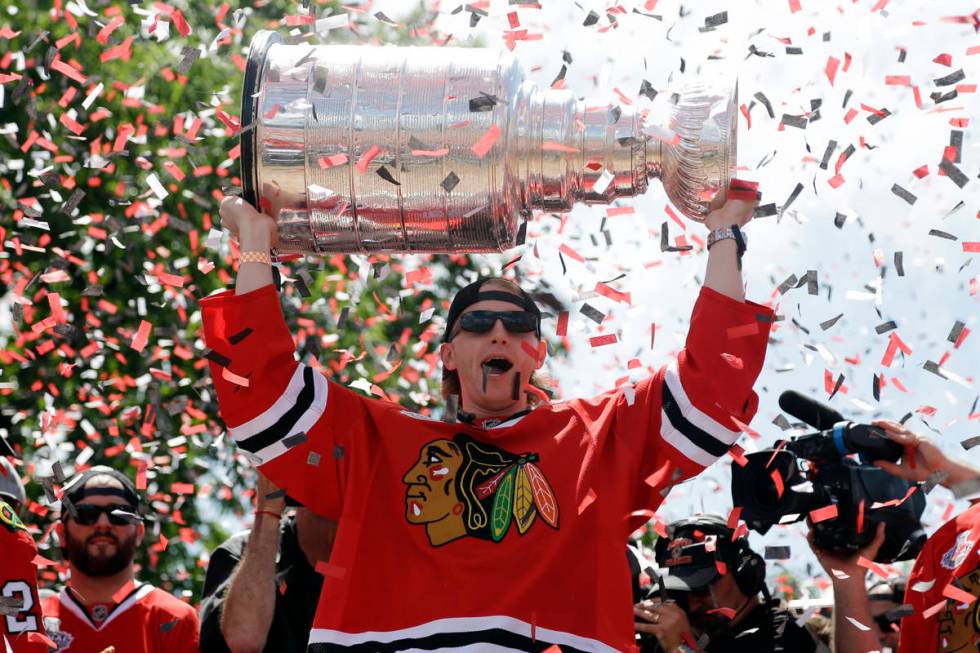Golden Knights say don’t put asterisk next to Stanley Cup champion

The idea of placing a figurative asterisk next to the name of this year’s Stanley Cup champion started with Drew Doughty. Shocker, right?
During a conference call in April, the outspoken Los Angeles Kings defenseman questioned the legitimacy of the postseason and told reporters “it’s not going to be like winning a real Stanley Cup.”
Doughty later admitted it was just sour grapes since his team was effectively eliminated from playoff contention by Thanksgiving.
But what Doughty seemed to forget is the NHL is famous for its unusual playoff formats, and its champions are remembered just as fondly regardless.
The winner of a midsummer 24-team tournament held during a global health crisis will be no different.
“It’s going to be probably one of the hardest trophies to win,” Knights left wing Jonathan Marchessault said. “Every team is healthy. Everyone is rested from their little boo-boos.
“At the end of the day, your name is on the Stanley Cup, so it’s going to be like the other ones, I think.”
Certainly the coronavirus pandemic forced the NHL to come up with a creative solution to complete its season. But the league is no stranger to odd postseasons dating to 1967-68 when it guaranteed an expansion team would be served up as ground chuck for an Original Six powerhouse in the Stanley Cup Final.
From 1998 to 2013, the Southeast Division was the black sheep of the three-division format and on multiple occasions caused the top point-getters from the Eastern Conference to meet sooner than usual in the playoffs.
And nobody holds it against the 1995 New Jersey Devils or 2013 Chicago Blackhawks that their championships came after a lockout-shortened 48-game regular season.
Critics of the 2020 postseason argue the 24-team field is watered down. Montreal was ranked 24th in the overall standings at the pause and 10 points out of a playoff spot, while Chicago (72 points) and Arizona (74 points) were making plans for the offseason, too.
All three teams then went out and won their qualifying-round series. Of course they did.
“It’s obviously different circumstances being shut down and not playing in front of any fans, but you still got to beat a lot of great teams out there to get to the end,” Knights defenseman Deryk Engelland said. “The amount of games aren’t changing, nothing like that. The competition’s not changing. It’s going to be hard no matter what year you’re playing in. It’s a hard trophy to win.”
The near five-month break after the season was paused March 12 adds unprecedented wrinkles to this year’s postseason.
For instance, players across the league were able to heal injuries, allowing nearly every team to be at full strength entering the playoffs. That never happens.
This year’s winner must make it through an extra round starting with the round robin or qualifiers. St. Louis matched an NHL record by playing 26 games en route to winning the Stanley Cup last season, and this year’s champion could play as many as 33.
All this while players are sequestered from their families for an extended period and risking their health during a pandemic to play at a neutral site with no fans inside the arena.
”I will tell you what. People are going to remember who won this Stanley Cup, and I think it might be the toughest Stanley Cup to win because everyone’s going to be healthy, the adversity of everything that’s going on,” Knights coach Pete DeBoer said. “You’re not getting any breaks. Four-out-of-seven format in every round. And particularly with the round robin and the play-in for seeding, you’re really almost playing an extra round of playoffs.
“I think it’s a spectacular format. I think it’s going to be outstanding hockey. Whoever wins it will have earned it.”
Contact David Schoen at dschoen@reviewjournal.com or 702-387-5203. Follow @DavidSchoenLVRJ on Twitter.